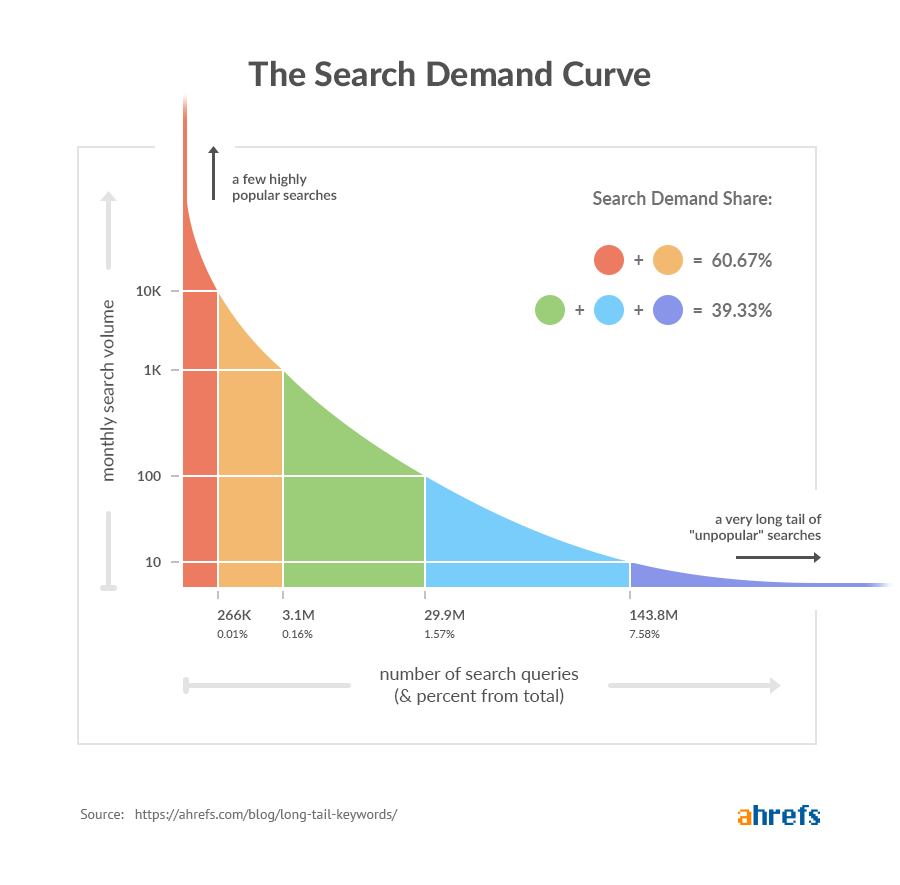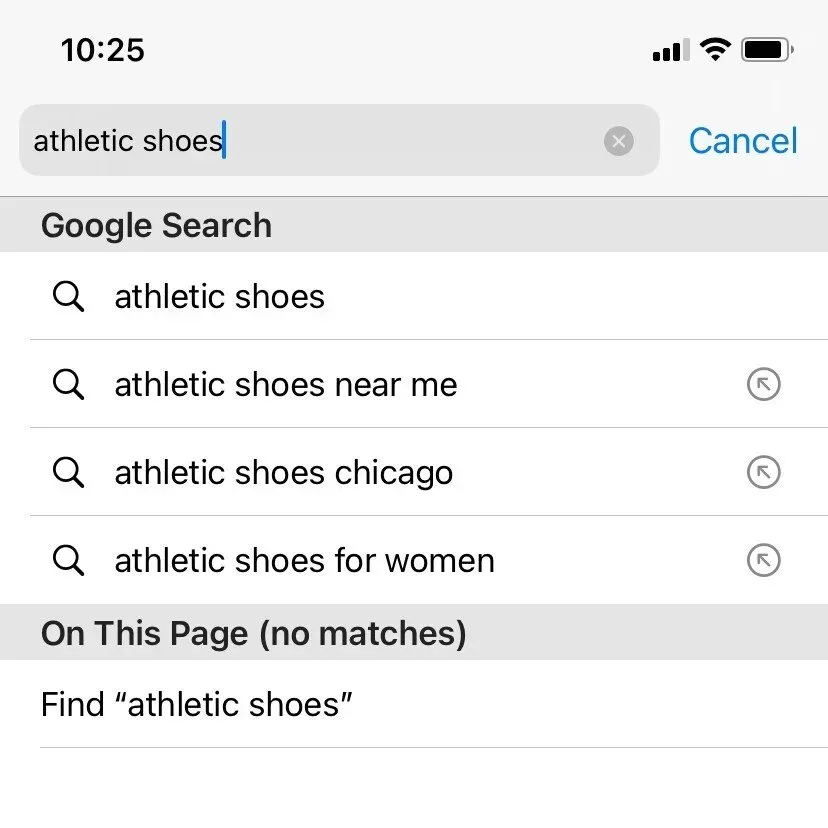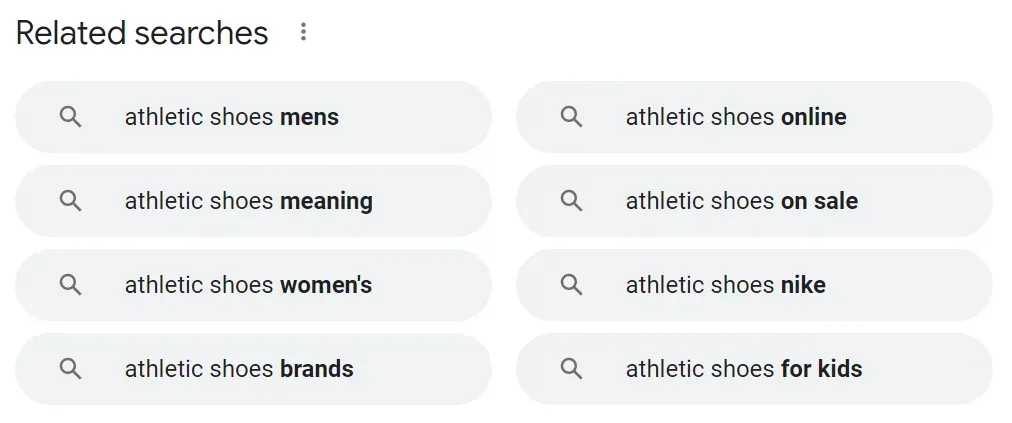What Are Long-Tail Keywords?

Are you frustrated by unsuccessful attempts to rank for high-competition keywords?
Long-tail keywords are a secret weapon in the competitive world of SEO. What are they? Quite simply, they’re unpopular phrases. Long-tail keywords are not glamorous or obvious – and that is precisely why they’re so potent.
Unpopular keywords tend to have low difficulty and low search volume. In bulk, ranking for unpopular keywords amounts to cumulative significant, sustainable traffic.
In the following content, we’ll define long-tail keywords and explore their benefit to a successful SEO strategy.
A Few Common Misconceptions
Long-tail keywords are "long-tail" because of their length
Nope! While it’s true that most long-tail keywords are comprised of 3+ words, this is a correlation. Not all long-tail keywords are long, and not all long keywords are long-tail. Say that three times fast.
In fact, certain 3+ word keywords are extremely popular. For example, “customer relationship management software” has a search volume of 1,300, while “relationship management software” has a search volume of 170. Again, “how to lose weight fast” has a search volume of 368,000 while “how to lose weight” has a volume of 135,000.
In other words, shorter keywords do not always have more volume. Keyword popularity is not dictated by the number of words in the phrase.
Long-tail keywords are always specific
Not always! Remember, a long-tail keyword is simply unpopular. Many long-tail keywords are specific, but that is not their defining trait. As seen in the example above, sometimes longer, more specific keywords are more challenging to rank for!
Long-tail keywords are always likely to convert
Because long-tail keywords are specific and unpopular, when someone searches Google for that phrase, their search intent is often conversion. For example, “athletic shoes” could be searched by someone looking for general information on the best shoes for their sport. On the other hand, “best women’s athletic shoes for walking” could be searched by someone who knows what they need and is ready to buy.
Of course, not all long-tail keywords are likely to convert, but many are.
In general, long-tail keywords are easier to rank for than head, or popular, keywords, because less search volume often means less competition. This is why they’re so potent to drive traffic to your website.
Why Are Long-Tail Keywords Important?
Firstly, because the majority of Google searches are long-tail. Ahrefs shares some helpful insight here. Among their US database of nearly 2 billion keywords, 92% of them receive ten searches per month or fewer.
This chart demonstrates why long-tail keywords are called “long-tail.” They fall at the long tail end – the unpopular end – of the search demand chart. The chart also indicates that 60% of search demand share is claimed by 0.16% of all search terms.
Numerous businesses, many with massive budgets, are vying for 0.16% of search terms.
Businesses who need a competitive edge can tap into the cumulative power of long-tail keywords. Ranking in the top 3 positions for hundreds of long-tail keywords can drive large amounts of conversion-ready traffic to your site.

This chart demonstrates why long-tail keywords are called “long-tail.” They fall at the long tail end – the unpopular end – of the search demand chart. The chart also indicates that 60% of search demand share is claimed by 0.16% of all search terms.
Numerous businesses, many with massive budgets, are vying for 0.16% of search terms.
Businesses who need a competitive edge can tap into the cumulative power of long-tail keywords. Ranking in the top 3 positions for hundreds of long-tail keywords can drive large amounts of conversion-ready traffic to your site.
What are SEO Services?
The Ultimate Guide for Businesses
You've decided SEO is right for your company. This guide covers how to hire a great SEO provider, what to expect, and what should be included in your service!
How Can I Find Long-Tail Keywords?
Convinced of the potential of long-tail keywords? The next step is identifying the best phrases for your business. Most long-tail keywords you find will be variations of a main topic or keyword. For example, our blog is about digital marketing, but we can’t target the phrase “digital marketing” on every one of our blogs. Thus, we need to find long-tail variations of this idea, branching out into multiple ideas related to our industry.
Start by identifying your primary topics or head keywords that make sense for your industry. From there, there are numerous sources to utilize to dig into long-tail variations.
We’ll start with a great free resource:
Google!

Google's Autocomplete Feature
Google has an awesome autocomplete feature that helps marketers identifying less popular searches related to a topic.
Rather than shooting for “athletic shoes,” try ranking for “athletic shoes for women.” Even better, try “best women’s athletic shoes for walking” or another long-tail variation.
Google's "People Also Ask" Box
The “people also ask” box lists commonly asked questions related to a search query. This box can show up at any position on the search engine results page. Any of these questions could be great keyword opportunities.


Google's "Searches Related To" Section
Finally, check the “searches related to” section at the bottom of the SERP.
A paid tool
Searching on Google for long-tail keyword ideas can be effective, but it is time consuming. As an alternative, there are awesome tools for expediating keyword research – and identifying juicy phrases that you may never find using Google’s tools.
At RivalMind, we often use SEMrush, but Moz and Ahrefs are great resources as well.
An SEO agency
Finally, outsourcing your digital marketing strategy to an SEO agency is another excellent option. Hiring an agency (like ours) ensures that you will receive a holistic digital marketing strategy, starting with keyword research.
You've Identified Your Long-Tail Keywords. What's Next?
Content! Now that you have a rich list of long-tail keywords related to your target topics, you can start writing. Consistently publish high-quality, informative, and original blogs, and track your rankings.
RivalMind: Results-Driven Marketing
At RivalMind, we start with calculated, measurable objectives, then develop world-class search marketing campaigns that attract, engage, influence, and convert visitors into lifelong customers.
Interested in taking your digital marketing to the next level? We’d love to start a conversion. Reach out via our online contact form or at
(331) 228-9636. You can also find us on most major social media platforms. We look forward to getting in touch!

Meet the Author
Josiah Flex
Senior Search Manager
Josiah Flex, a digital marketer, is passionate about helping companies see real, lasting growth. With a background in personal training, he enjoys helping people identify and achieve their goals – from online visibility to increased leads. Ultimately, consumers use search engines, like Google, to identify the best answer for their needs, and companies engaged in great SEO have the highest likelihood of winning prospective consumers, one step at a time. This is true success.
Specialties: Building Client Relationships, RivalMind Hype Guy
Looking for more organic website traffic?
Welcome to RivalMind. Our purpose is to help your business thrive. We are a digital marketing agency that offers SEO, PPC, Web Design, Social Media and Video Solutions as tools to our clients for online business development and growth.
Contact us today to get started!
Blog Contact Form
Connect with Us:




